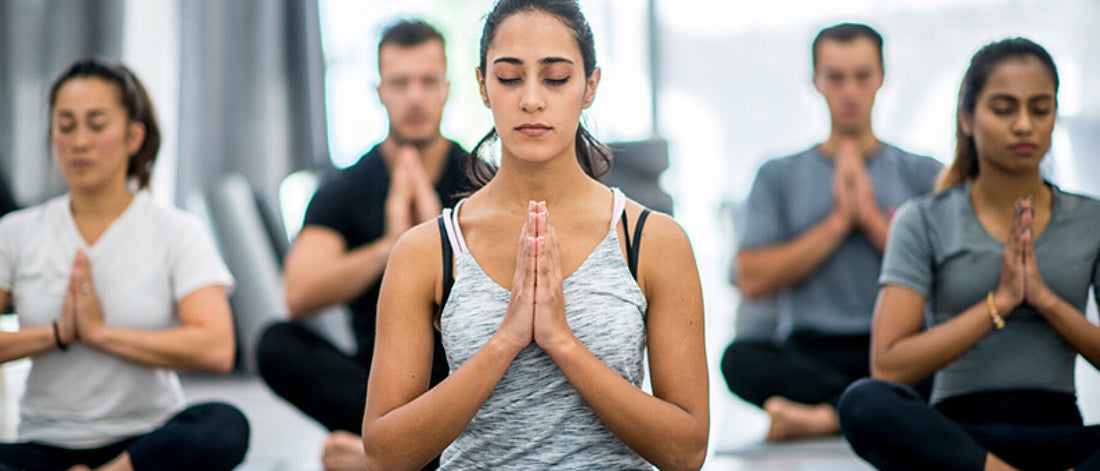Meditation retreats and classes provide unique benefits when you are looking to explore a greater sense of community and guidance. In order to decide between a retreat or a class, it is important to understand not only the distinction between the two but also your lifestyle and desires.
To decide whether a meditation class or retreat is right for you depends on your capabilities, goals, and intentions. If you are still unsure about which may be right for you, start your meditative practice. If you set your intention, the answer might just present itself.
Discover Deepak Chopra’s secrets to living a life of effortless abundance at our one-of-a-kind event, Infinite Possibilities. Learn More.
What Is a Meditation Retreat?
A meditation retreat can feel like a vacation and workshop rolled into one. You have the opportunity to travel to a generally serene location, away from the demands and restrictions of daily life, and you get to focus on yourself and your meditation practice. Most retreats vary based on their theme and focus, but the commonalities include the same primary intentions—relaxation, well-being, and personal connection and development. There are many different variables when it comes to choosing what retreat is right for you including location, theme, intention, cost, and time.- Location: Meditation retreats can be based anywhere—from Colorado all the way to India. Some retreats focus on a simplistic and minimal view, offering comfortable, yet humble, sleeping arrangements similar to college dorm rooms as they are hosted in cabin-like housing. On the other hand, there are retreats that are hosted at world-renowned resorts with amenities and luxury accommodations.
- Theme: The theme is ultimately one of the most critical aspects of a meditation retreat. The theme is what unites the specific meditative retreat including the techniques taught, the guidance provided, the lectures offered, and the exercises. Some common themes include manifestation, interpersonal connection, active meditation (like yoga), and silent retreats.
- Intention: A common practice in meditation is to set an intention, usually before or after your practice. This also applies to choosing a retreat. Some examples of an intention might be to meet like-minded people, deepen your connection with your practice, or to create a new experience with guidance from trusted educators.
- Financial considerations: Meditation retreats can vary greatly in price—some may be free of charge while others may require a significant financial investment.
- Accommodations: Accommodations associated with retreats may include food, transportation, and housing. These offerings vary—be sure to confirm what is included when you are booking a retreat stay.
- Time: Retreats can range from one day to 30, 60, 90 days, and beyond.
What to Expect at a Meditation Retreat
Meditation retreats are often centered around personal development and spirituality. The specific intentions and goals of each guest may be different; however, everyone is there for a common purpose—greater well-being.- Nourishment: Most retreats offer nourishment in the form of food and drink for breakfast, lunch, and dinner. Often, the food is health-conscious and geared at fueling your body, mind, and soul.
- Like-minded people: Retreats are a great place to meet like-minded people—sometimes from all over the world. Many people travel to these retreats because of a set of shared values, not only in the practice of meditation but in overall daily life.
- Exercises, techniques, and tools: A host of tools and techniques are offered at meditation retreats that can help you learn more or deepen your practice. Some retreats offer extensive one-on-one education and guidance for your specific intentions and group meditative practices. There are often speakers who give presentations and facilitate group exercises.
- Personal growth: If you attend a meditation retreat, you have the ability to expand your perspective and grow your practice. Whether you attend a retreat alone or with a partner, you can focus on yourself, your practice, and personal growth and development.
- A detox from distractions: Most retreats encourage a disconnect from the distractions of daily life including your phone. While the choice is ultimately yours, you have the ability to detox from texts, emails, calls, and television.
Should You Go to a Meditation Retreat?
Meditation retreats can be a great learning experience not only if you are new to meditation but also if you are an experienced practitioner. If you are just starting out, retreats can provide helpful guidance from experienced mentors and master educators that you might not get otherwise. You can explore your meditative practice free from the distractions of daily life, while being surrounded by a group of like-minded people with similar goals. If you are an experienced meditator, you have the ability to deepen your practice and explore beyond the daily meditative practices in a new and guided environment.What Is a Meditation Class?
A meditation class can feel like a community event for meditation, which is generally regarded as a personal practice. Although there are many different techniques, styles, and intentions for classes, the general focus is to center your mind and rid yourself of cluttering thoughts. Meditation classes can be in a one-on-one setting with a trained guide, in a class with others and a guide, or an unguided group.Types of Meditation Classes
Meditation classes can vary based on the different types of meditation techniques. Therefore, your experience at each class may be different depending on the focus, location, community, and guide or educator. The following are common forms of meditation classes offered that focus on a few different elements:- Yoga: Yoga is a type of active meditation that often pairs body movement with breath and mind. There are many different styles of yoga meditation, including Kundalini and restorative, that involve breathwork, mantra recitation, and stretching. Yoga classes are offered in one-on-one, small-, and large-group settings.
- Tai Chi: Tai Chi is meditation in motion that involves pairing slow, balanced, and graceful movements with breathing techniques. It’s often referred to as “shadow boxing.” There are centers for Tai Chi and classes vary in size based on the specific offerings of the company or group instructing.
- Japa: Japa meditation focuses on the repetition of words or phrases, known as mantras, and is considered one of the oldest forms of meditation.
- Breath-Awareness: This is a style of meditation that involves a heighted focus on the inhale and exhale as you breathe.
- Loving-Kindness: Loving-kindness meditation is also referred to as metta meditation and it focuses on the four qualities of love: friendliness, compassion, appreciative joy, and patience. Often it includes recitation of words and phrases that evoke feelings of love, happiness, and well-being to yourself and all beings.
- Visualization: This type of meditation encourages the use of imagery to develop a picture in your mind’s eye. It is common mindfulness practice to vividly envision the desired outcome through depth of sensory recall.
What to Expect at a Meditation Class
Meditation classes vary based on a number of factors including location, style, community, technique, and the associated guide. However, there are a few commonalities you can expect at most classes including:- Guidance: Meditation classes are led by a certified guide or instructor. Depending on the focus of the class, your guide may talk through most of it or simply be there as support alongside music, drums, or an assortment of other sounds to help focus your mind.
- Community: Although meditation is often considered a solitary practice, classes can provide a sense of unspoken community. You will most likely be sitting or participating in some form of movement next to other people and you may feel a sense of community through your shared spiritual practice.
- Controlled setting: Meditation classes can provide a sense of spiritual retreat through the location and setting. Some meditation classes are held outdoors or in serene locations, while others may be held indoors, away from external distractions.
Should You Go to a Meditation Class?
Meditation classes can be a great way to dip your toe into different styles and techniques of the spiritual practice. If you are a beginner, classes can help you explore many methods of meditation with the benefit of having a guide or meditation teacher educate and support you. Classes offered at local locations encourage a community feeling, as you often see many of the same people. Meditation classes can also provide a sense of retreat with a shorter time commitment, an enhanced sense of community, and guidance.To decide whether a meditation class or retreat is right for you depends on your capabilities, goals, and intentions. If you are still unsure about which may be right for you, start your meditative practice. If you set your intention, the answer might just present itself.
Discover Deepak Chopra’s secrets to living a life of effortless abundance at our one-of-a-kind event, Infinite Possibilities. Learn More.






















